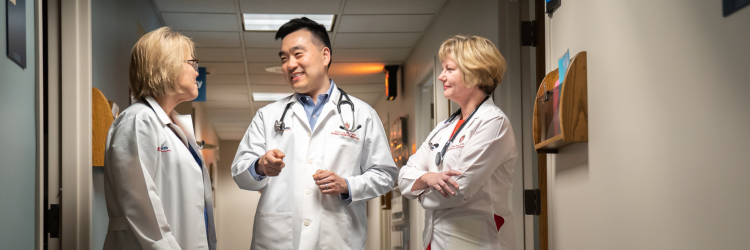New study shows effectiveness of remote scribes in reducing physician burnout

A new study by members of the University of Wisconsin (UW) Health primary care team may be the first to help clarify the effectiveness of remote medical scribes in improving physician well-being and electronic health record (EHR) interactions.
In the United States, physician burnout is a major problem exacerbated by record-keeping requirements that can often only be met with long, isolated hours outside the standard workday.
Medical scribe programs place a staff member trained in EHR usage in the room during physician-patient interactions; their role is to take notes in real time, thereby lessening the burden on physicians. Across several small studies, scribe programs have pointed to reduced EHR time, improved well-being, and lower burnout rates. However, nearly all studies have focused on scribes who were physically in the room during clinical interactions.
The UW Health study, begun in 2019 and published in the December 2022 issue of Healthcare, included primary care physicians (PCPs) in general internal medicine, family medicine, and general pediatrics and adolescent medicine, across 36 clinics in the UW Health system.
Scribes were connected to PCPs via an audio-only cellphone connection to hear and document. Physician well-being and EHR use was evaluated pre and post-scribe engagement. Results were compared to those of a control group working without remote scribes.
The overall conclusion of the study was that remote scribe usage clearly improved well-being markers and had “similar beneficial wellness and EHR associations with remote scribes as found with in-person scribes in other studies.”

The study’s lead author, Mark Micek, MD, MPH, associate clinical professor, General Internal Medicine (right), notes of these findings: “Many of us are increasingly feeling the burden of visit documentation, which pulls us away from our meaningful interactions with patients. This study fortunately shows that there are things healthcare organizations can do—such as providing scribes to clinicians—to help reduce burnout and EHR workload. We are fortunate that UW Health supports scribes for clinicians who want them.”
The study was co-authored by:
- Brian Arndt, MD, associate professor, Department of Family Medicine and Community Health, UW School of Medicine and Public Health (SMPH)
- Jeffrey Baltus, MS, senior data scientist, Department of Family Medicine and Community Health, SMPH
- Aimee Teo Broman, MA, biostatistician, Department of Biostatistics and Medical Informatics, SMPH
- Joel Galang, MS, data scientist, Nift Business Network
- Shannon Dean, MD, MMM, FAMIA, vice president and chief information officer, St. Jude Children's Research Hospital
- Matthew Anderson, MD, MHA, enterprise senior vice president and senior medical director, Atrium Health Medical Group in Charlotte, NC
- Christine Sinsky, MD, vice president of professional satisfaction, American Medical Association
Banner: a consultation between primary care physicians. Credit: Clint Thayer/Department of Medicine.